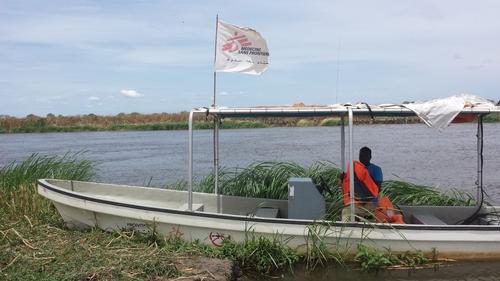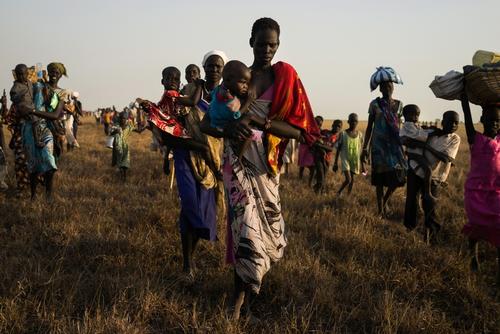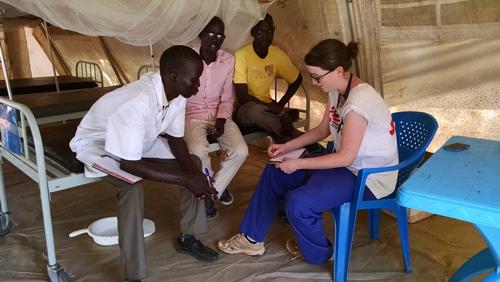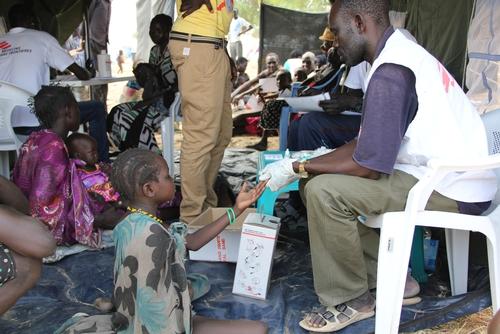Skye Giannino is a nurse from Victoria State in Australia. In April 2016 she supervised a Médecins Sans Frontières (MSF) vaccination campaign in Old Fangak, North-West of South Sudan. She shares a day in the life of this challenging assignment.
“Day three of African Vaccination Week and I’m grinning maniacally at a toddler crying post injection. It is not sleep deprivation causing this reaction, though it would be acceptable to think so – the days leading up to and during this campaign have been very long. No; it is because I know something he doesn’t. After he wriggles free of his mothers arms I beckon to him… wary but curious, this little one slowly walks toward me with little encouragement. Tears streaming down his face and a snotty nose, he rubs his arm where the measles vaccine has just been injected. I push a colorful sticker onto his hand that says ‘Super star’ and say “Goa along”- Very good in Nuer. He eyes me warily before backing away from the pain he just endured and I think to myself; there goes another child protected from vaccine preventable disease, more toddler steps toward a healthier South Sudan.
The population lacks access to essential care
After decades of conflict and instability the population lacks access to essential care because of the low number of well-equipped medical facilities and the very small number of trained medical staff. In this context, vaccination coverage of children is a priority to protect them from severe and preventable disease. During this campaign, the MSF team set out to vaccinate 5,000 children. But this region is located in one of the biggest swamp areas in the world and logistics is a major challenge for us.
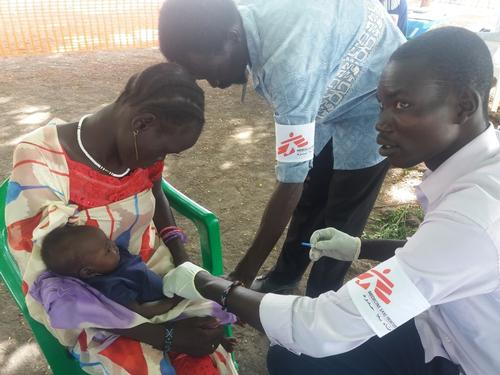
Today we are in Dhoreak, a remote village an impossible reach away from the hospital MSF supports in Fangak county. The mobile team and I took an hour speedboat ride, a long hot and sweaty hike through forest and farmland and a short canoe paddle through swamp to get here. It was worth it. The community is thrilled someone has come to give some much-needed attention to the population.
The women have come in crowds to have their children and babies vaccinated and we are taking this opportunity to also give them tetanus vaccine, to ensure their newborns are protected when they enter this world. The men and elders have also come to greet us and curious school children are milling around staring at the “Kawaja” (white in South Sudanese dialects) – they have never seen a white woman before. I entertain them for a while before telling them to go and get their baby brothers and sisters – it can get uncomfortable having people watch your every move, I now know what if feels like to be a C grade celebrity – one that is covered in flies, dirt and sweat!
Children are receiving multiple at once to increase the coverage of childhood vaccination
I watch while the team works hard, most of the children have never been immunized, so they are receiving multiple antigens at once in an accelerated attempt to increase the coverage of childhood vaccination. In Australia, like many countries in the world, we are free from some of these diseases due to functioning health care systems, education on disease prevention and access to vaccines. Unfortunately, diseases like polio and measles are prevalent in vulnerable communities such as this one, and outbreaks are a huge risk – preying on young children. With barriers to receive help if illness strikes, it is a high priority to increase prevention and protect the people as a whole – hence my grin got crazily bigger with every injection given.
After a solid 4 hour session and great number of kids vaccinated, the crowds dwindled and the team was generously thanked with local food for lunch. An elderly man who had sat quietly under the tree most of the morning came over and with tears in his eyes put his hand on my head then my heart. A blessing from the elders. The staff translated “Dhoreak loves you”. Humbled, I thanked them for the hospitality and good turn out and with a promise to return in one month for follow up we started the long journey back. The team was quiet on the hike home, tired from the work but with smiles on their faces, content with the knowledge their people are now protected. It is moments like this I wouldn’t want to be anywhere else.Lets’ hope Day 4 is another success!”
MSF has been working in the region that today constitutes the Republic of South Sudan since 1983. We employ more than 3,200 South Sudanese staff and more than 330 international staff to respond to a wide range of medical emergencies and provide free, high quality healthcare in 17 projects across the country and the Abyei Special Administrative Area.



